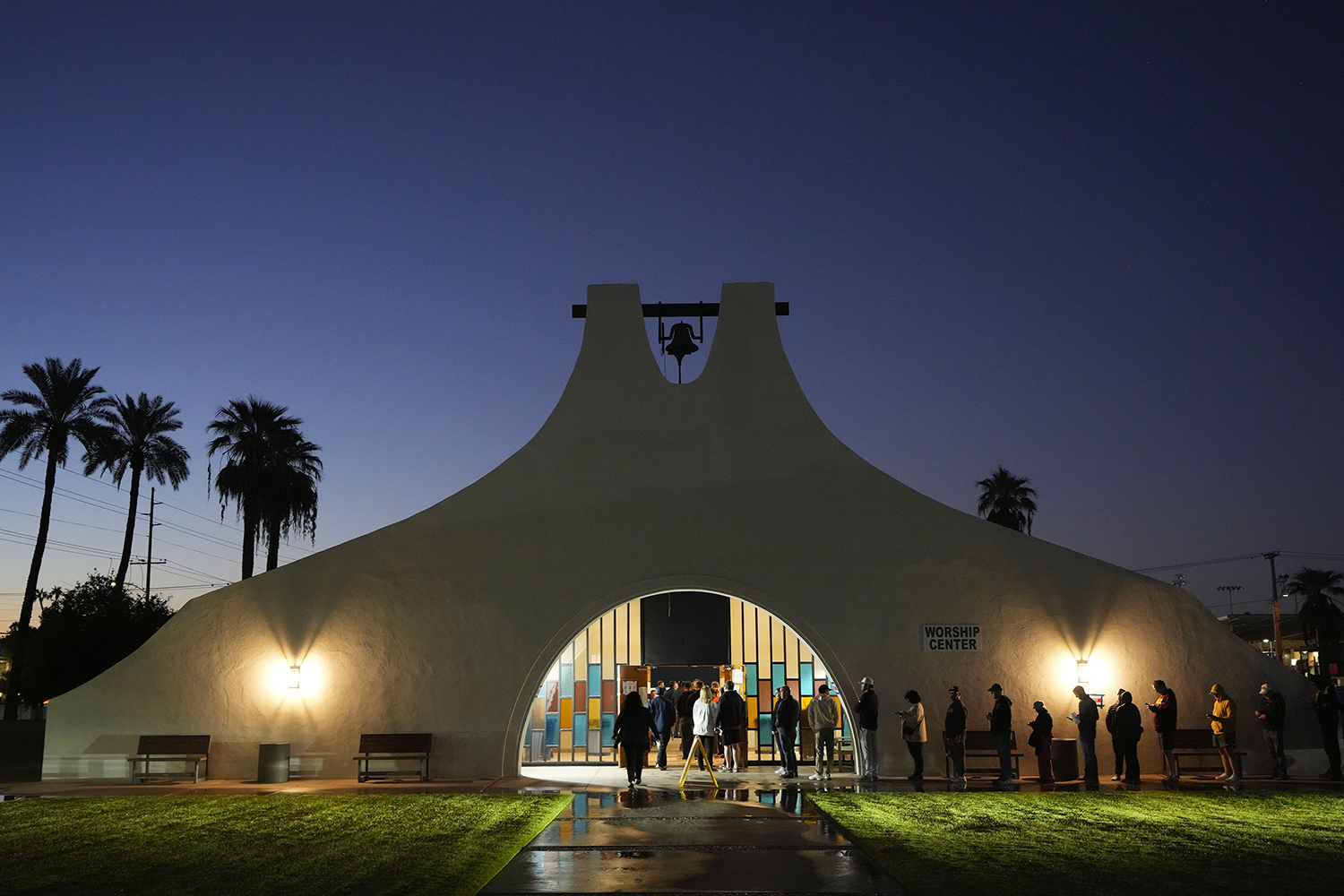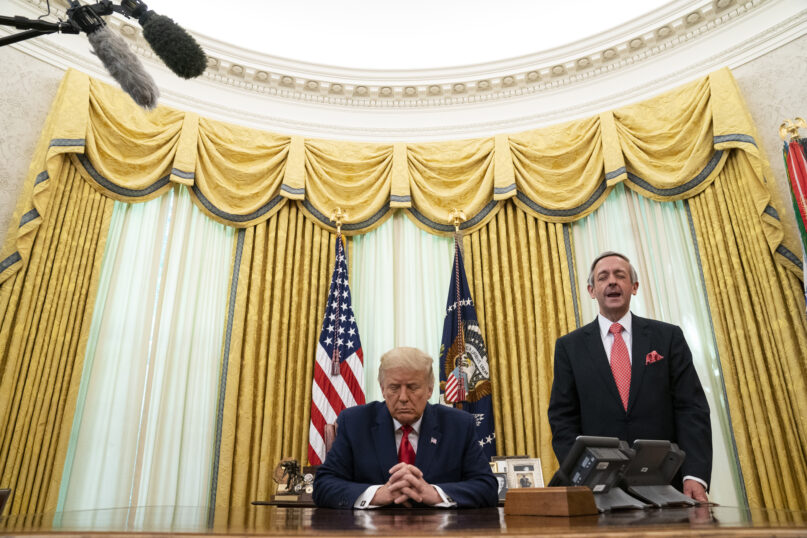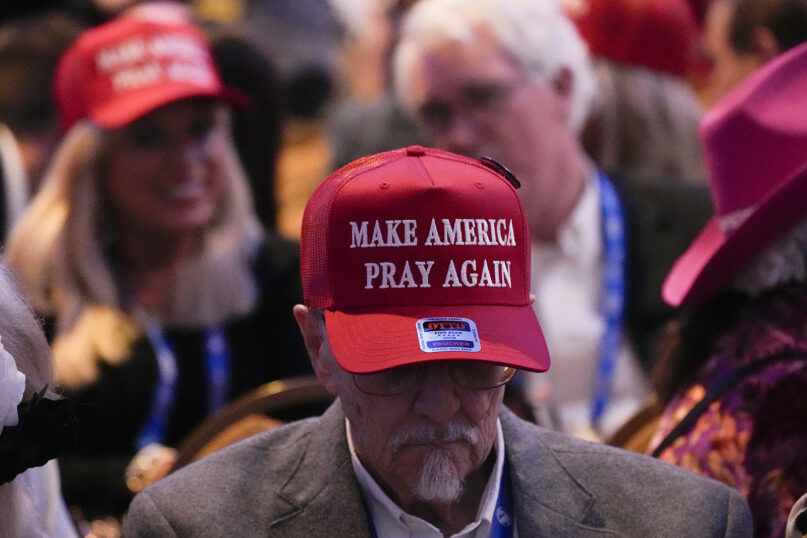
(RNS) — For years, conservative legal groups have argued that an IRS rule barring churches from endorsing candidates was unconstitutional.
Now the IRS agrees.
In a court filing, the IRS said the-so called Johnson Amendment, which bars all nonprofits from being involved in campaigns, should not apply to political speech during religious services. Speaking about politics at a church or other house of worship is not the same as intervening or participating in an election, lawyers for the IRS as well as for conservative groups suing the agency wrote.
“Bona fide communications internal to a house of worship, between the house of worship and its congregation, in connection with religious services, do neither of those things, any more than does a family discussion concerning candidates,” they wrote. “Thus, communications from a house of worship to its congregation in connection with religious services through its usual channels of communication on matters of faith do not run afoul of the Johnson Amendment as properly interpreted.”
The filing also notes that the IRS has rarely punished houses of worship for endorsements during religious services, though the agency has investigated churches over alleged Johnson Amendment violations. In April, Robert Jeffress, pastor of First Baptist Church in Dallas, told RNS that his church spent “hundreds of thousands of dollars” during an IRS investigation.

Pastor Robert Jeffress and President Donald Trump pray in the Oval Office of the White House, Aug. 28, 2020, in Washington. (AP Photo/Evan Vucci, File)
“The case was ultimately resolved in our favor,” he said. Jeffress also said he’d been with President Donald Trump during a meeting where several pastors also spoke about being investigated over alleged Johnson Amendment violations. Trump has long promised to do away with the IRS rules barring pulpit endorsements. During his first term in office, Trump signed an executive order designed to give churches more leeway under IRS rules.
Still, only one church has ever lost its tax exemption over politics. In 1992, a church in New York took out ads opposing Bill Clinton, leading to the loss of its tax exemption.
The federal court filing is part of a proposed settlement of a lawsuit filed by the National Religious Broadcasters and a pair of Texas churches that sought to overturn the Johnson Amendment, named after famed Texas politician and former U.S. President Lyndon B. Johnson.
Those groups argued that some nonprofit newspapers and other publications have been allowed to endorse candidates without running afoul of the IRS, while IRS rules barred churches and other nonprofits from doing the same.
“Plaintiffs believe that nonprofit newspapers have a clear constitutional right to make such endorsements or statements,” wrote lawyers for the plaintiffs in a complaint filed last August in the U.S. District Court of the Eastern District of Texas, Tyler Division. “Plaintiffs simply contend that they should also have the same freedom of speech.”
The NRB declined to comment about the proposed settlement. A spokesperson said the group was waiting to see if the judge approves the settlement.

A man wears a Make America Pray Again hat before former President Donald Trump speaks at the National Religious Broadcasters convention at the Gaylord Opryland Resort and Convention Center, Feb. 22, 2024, in Nashville, Tenn. (AP Photo/George Walker IV)
The most recent filing in the lawsuit argues that for some religious groups, speaking about politics is a part of the free exercise of their faith.
“For many houses of worship, the exercise of their religious beliefs includes teaching or instructing congregations regarding all aspects of life, including guidance concerning the impact of faith on the choices inherent in electoral politics,” according to the filing.
The proposed settlement would bar the IRS from requiring Sand Springs Church in Athens, Texas, and First Baptist Church in Waskom, Texas, from having to abide by the Johnson Amendment, both now and in the future. Both parties would pay their own legal bills. Neither side would be allowed to appeal.
The plaintiffs also asked the court to rule that the Johnson Amendment’s ban on political speech by nonprofits is unconstitutional.
But according to Sam Brunson, a professor at Loyola University Chicago’s law school and an expert on tax law, the IRS’ legal agreement ultimately may not change much about how the Johnson Amendment already functions in practice.
“This doesn’t really represent a change in the 70 years that the Johnson Amendment has been law,” he said. “It’s been enforced once against a church, and you see a lot of cases of churches trying to jump in and get their exemptions revoked so that they can challenge the constitutionality. And up until now, the IRS hasn’t been willing to do that.”
Even so, Brunson said the legal filing — while narrowly tailored to the plaintiffs in question — may give other religious groups confidence that public endorsements won’t result in a challenge to their tax-exempt status.
Christian legal groups have long sought to overturn the Johnson Amendment. For years Alliance Defending Freedom, one such group, organized “pulpit freedom” Sundays designed to have preachers violate IRS rules by endorsing candidates from the pulpit. But those efforts were futile and the ADF no longer runs Pulpit Sunday initiatives.
Americans United for Separation of Church and State urged the judge in the case to reject the settlement. “Weakening this law would undermine houses of worship and nonprofits by transforming them into political action committees, flooding our elections with even more dark money,” Americans United said in a statement.
Americans — including religious Americans — generally take a dim view of political endorsements in the pulpit. According to an analysis of 2023 polling provided to RNS by the Public Religion Research Institute, majorities of all major religious groups oppose or strongly oppose allowing churches and places of worship to endorse political candidates while retaining their tax-exempt status. That includes white evangelicals (62%) as well as Black Protestants (59%), white mainline or nonevangelical Protestants (77%), white Catholics (79%), Hispanic Catholics (78%), Hispanic Protestants (72%) and Jewish Americans (77%).
Researchers noted opposition to the idea among white evangelicals remains virtually unchanged since 2017, when they last polled on the topic.
There was one outlier, however: People labeled by PRRI as “adherents” to Christian nationalism — people who agree with statements such as “the U.S. government should declare America a Christian nation” — were statistically more likely (45%) to support endorsements from the pulpit, with only a narrow majority (51%) opposed.
A 2024 survey of Protestant pastors by Lifeway Research, an evangelical firm, found that 2% of pastors said they’d endorsed a candidate during a church service, while 25% said they had endorsed a candidate outside of their role at church.
A recent report from Hartford Institute for Religion Research found that about a quarter of local leaders described their congregation as politically active, while 40% said their congregation had been involved in “overtly political activities,” RNS has previously reported.
A 2019 survey from Pew Research found that 76% of Americans and 70% of Christians say clergy should not endorse candidates from the pulpit, though evangelicals (62%) and Black Protestants (55%) are less likely to disapprove. Two-thirds of Americans (63%) wanted churches to stay out of politics.
